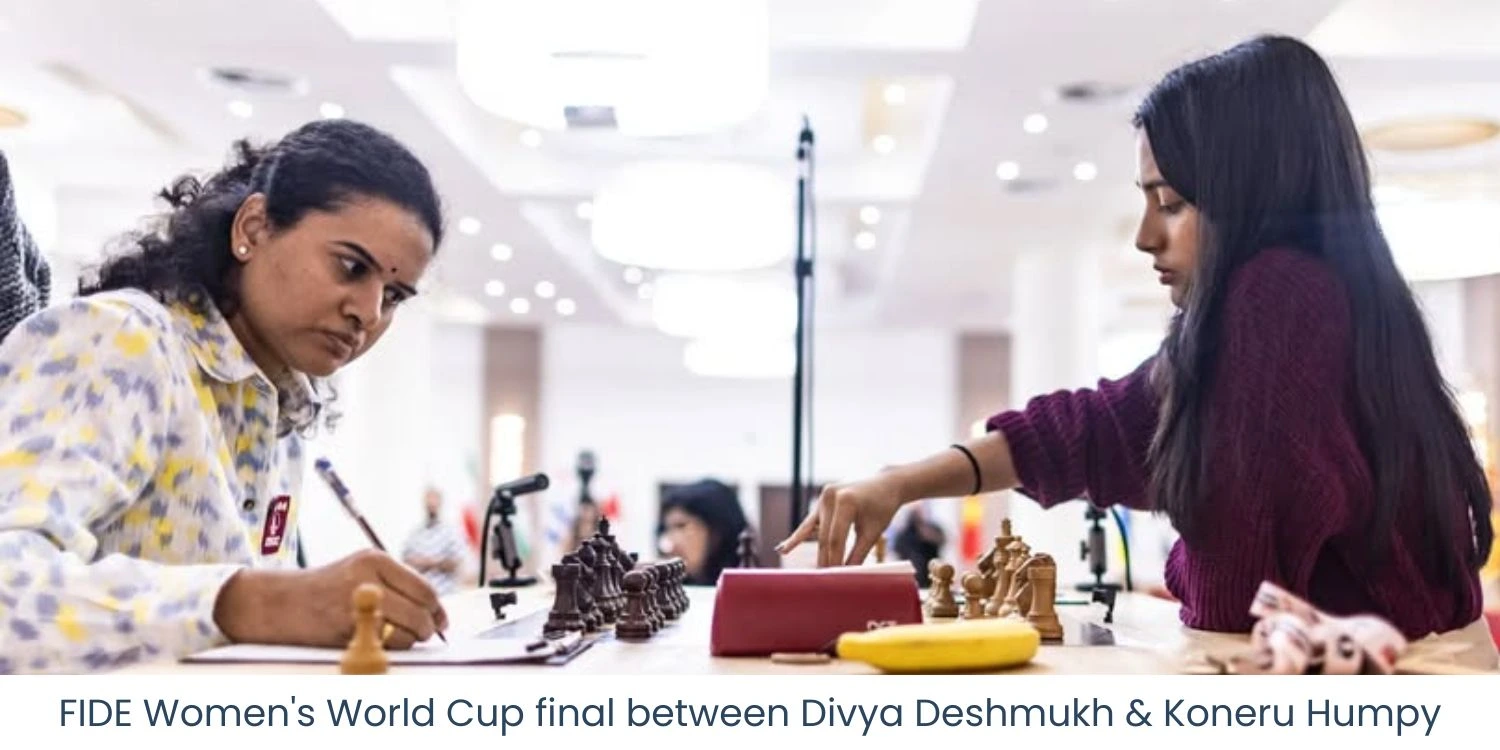At just 19 years old, Divya Deshmukh has achieved the biggest success of her career by winning the FIDE Women’s World Cup 2025. She defeated her more experienced compatriot, Koneru Humpy, in a thrilling tiebreak match with a score of 2.5–1.5. This made her India’s first female World Cup champion.
This victory didn’t just bring her a trophy—it made her a Grandmaster too. Divya is now the 88th Indian to earn the title and only the fourth Indian woman to do so, joining the elite company of Koneru Humpy, Dronavalli Harika, and R Vaishali.
Also Read: How to Become a Grandmaster in Chess?
The final was intense. The two classical games played over the weekend ended in draws. But Divya stayed calm, showed great fighting spirit, and sealed the win in the rapid tiebreaks. What seemed improbable at the start of the tournament turned into a dream come true.
Tournament Background
The 2025 Women’s Chess World Cup was held in Batumi, Georgia, from July 5 to July 28. It was the third edition of the event and brought together 107 of the world’s top women players in a 7-round knockout format.
To balance the draw, the top 21 seeds were given a direct entry into the second round. The tournament followed a single-elimination style—meaning one loss and the player was out. The two players who lost in the semifinals played a match to decide third place.
The top three finishers—Divya Deshmukh, Koneru Humpy, and Tan Zhongyi—qualified for the Women’s Candidates Tournament 2026, the next step toward the World Championship.
Match Format:
Each round had up to three days of play:
- Days 1 & 2: Two classical games with long time control
(90 minutes + 30 seconds increment per move, plus a 30-minute boost at move 40) - Day 3 (if tied):
- 2 rapid games (15 minutes + 10-second increment)
- If still tied, 2 more rapid games (10 minutes + 10-second increment)
- Then, 2 blitz games (5 minutes + 3-second increment)
- Finally, if still undecided: sudden death blitz games (3 minutes + 2-second increment) until a winner emerged
- 2 rapid games (15 minutes + 10-second increment)
This format tested both deep thinking and quick decision-making—making Divya’s win even more impressive. She stayed focused, calm, and flexible across all types of games.
Divya Deshmukh’s Chess Journey in the Tournament

Divya Deshmukh started her FIDE Women’s World Cup journey as the 15th seed. While many top players had higher ratings, Divya let her moves speak louder than numbers.
She began in the second round, facing Keti Mgeladze from Georgia. Divya played solidly and won the match 1.5–0.5. In the third round, she was paired with Serbia’s Teodora Injac. Once again, she showed calm nerves and smart play, winning the match by the same score.
Things got tougher in the fourth round against China’s Jiner Zhu. After two hard-fought games, the match went to tiebreaks. But Divya didn’t panic. She stayed focused and won the rapid games to move ahead 2.5–1.5.
In the quarterfinals, she met Harika Dronavalli, one of India’s most experienced players. This was a big test, but Divya rose to the occasion. She played with a mix of aggression and discipline, and won the match 3–1.
Then came the semifinals against Tan Zhongyi, a former world champion from China. Many thought the pressure might catch up to Divya. But she played her best chess yet, winning 2.5–0.5 in style.

The final was the ultimate challenge. Facing Koneru Humpy—a legend in Indian women’s chess—was both emotional and intense. The classical games ended in draws, pushing the match into tiebreaks. Divya showed maturity beyond her years and won both rapid games, taking the crown with a final score of 2.5–1.5.
From the second round to the final, Divya defeated champions and outperformed expectations. She didn’t just win matches—she earned the world’s respect.
Also Read: How Did Nona Gaprindashvili Become a Trailblazer in Women’s Chess?
Divya Deshmukh’s Words After Winning
After lifting the trophy, Divya spoke with honesty and emotion:
“I think it was fate—me getting the Grandmaster title this way. Because before this, I didn’t even have one norm coming into the event. All I was thinking of was, ‘Oh, when can I get my norm?’ And now… I’m a crown master.”
What We Can Learn From Divya Deshmukh’s Journey?
Divya Deshmukh’s journey is proof that chess is more than a game. It builds confidence. It sharpens the mind. And most importantly, it teaches patience, focus, and decision-making—skills that help in school, career, and life.
You don’t have to be a prodigy to enjoy these benefits. Chess is for everyone. Your child can start by simply playing with friends or family. Even 10 minutes a day can make a difference.
And if they want to go deeper, there are many online chess academies where kids can learn from trained coaches—all from home. These platforms are safe, structured, and fun.
So whether your goal is to improve your child’s thinking skills or just give them a healthy, screen-free hobby, chess is a great place to start.
Just like Divya, every champion begins with one small move.
Related Articles:
What Is Gukesh D’s Chess Style?
List of World Chess Champions (1886–2025)



